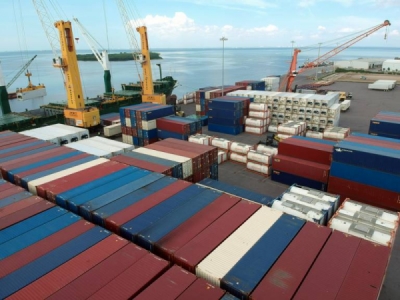
Posted on October 29, 2020
Port Manatee’s flourishing role as a powerful economic engine for Manatee County and beyond has a special ingredient for success that may be found “in the box.”
While outside-the-box thinking and proactive diversification strategies have built Port Manatee into a sustaining socioeconomic dynamo over its half century of history, it is the box – the intermodal shipping container – that appears to hold the key to present and future growth.
As reported earlier this month, Port Manatee’s containerized cargo trade surged nearly 55 percent in the fiscal year ended Sept. 30, compared with the immediately preceding 12-month period. The record number of 20-foot-equivalent container units – or TEUs – moving across the port’s docks in fiscal 2020 was more than double the count for fiscal 2018.
The recent surge in Port Manatee’s container activity is being led by two companies in particular – longtime port tenant Del Monte Fresh Produce Co. and relative newcomer World Direct Shipping.
Del Monte is in its fourth decade of operating at Port Manatee, importing bananas, pineapples, avocados and other produce from Latin America through its on-port distribution center. Over the past few years, Del Monte increasingly has been relying upon containers for moving its produce, in a shift from the historic practice of shipping such cargos on pallets.
At the same time, World Direct Shipping, or WDS for short, has emerged as one of the world’s fastest-growing container lines. Headquartered at Port Manatee, WDS began operations in 2014, with a single chartered vessel offering the fastest short-sea link between Mexico and the U.S. Southeast, connecting one Mexican port with Port Manatee. WDS now serves three Mexican ports, using three containerships it owns.
With produce making up a significant share of the trade, many of the containers coming into Port Manatee are so-called reefers – refrigerated boxes with their own built-in cooling units.
Always focused on the future, Port Manatee is preparing to handle still-greater volumes with expansion of its dockside container yard. The $8.3 million endeavor, on target for mid-2021 completion, bodes to nearly double the size of the existing 10-acre paved facility adjoining Berth 12 and 14 docks, where the port’s three mobile harbor cranes join shipboard gear in moving boxes on and off containerships. The project includes installation of 150 new electrical receptacles for plugging in reefer boxes, to bring the port’s total of such reefer plugs to 600.
But it’s not just chilled produce moving in the 40-foot-long (and sometimes 20-foot-long) steel cargo boxes. Goods in the stackable containers run the gamut from sugar to wood pulp, from cornmeal to phosphates, from tequila to refrigerators, washers, dryers and air conditioners. Special container units consisting of large tanks in steel frames are used for transport of juices.
Port Manatee’s senior manager of trade development, Malcolm Edwards, a member of the marketing team under Port Manatee Chief Commercial Officer Matty Appice, says shipping containers are like that proverbial box of chocolates – you never know what you’re going to get.
It is another Malcolm – Malcolm McLean, who later dropped a letter from his first name to become known as Malcom McLean – who was the mastermind behind development of the modern shipping container. The co-founder of McLean Trucking Co. came up with idea of containerization in the 1950s, and, in 1956, the first containership, the SS Ideal-X, a converted military tanker, sailed from the Port Newark-Elizabeth Marine Terminal in New Jersey to the Port of Houston carrying 58 “Trailer Vans,” 35-foot-long units that would soon become known as the industry’s first cargo containers. McLean found such means reduced transport costs and enhanced speed and reliability by eliminating the need for repeated handling of individual pieces of cargo.
Containerization, just like Port Manatee, continues to evolve to meet demands for efficient, cost-effective transportation. Indeed, containerization is an increasingly crucial factor in Port Manatee’s contributions to regional prosperity, with impacts of more than $3.9 billion a year while directly and indirectly generating more than 27,000 jobs, all without benefit of local property tax support.
Carlos Buqueras is executive director of Port Manatee.
Source: bradenton





